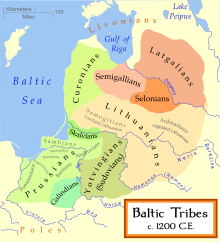
Back Pruise (volk) Afrikaans Prusianos AN بروسيون Arabic Prusslar Azerbaijani Прустар Bashkir Prūsā BAT-SMG Прусы Byelorussian Пруси Bulgarian Prusi BS Prussians Catalan
 The Old Prussians' territory in lime green, ca. 1200 AD. The boundaries are approximations. |
| History of Brandenburg and Prussia |
|---|
  |
|
| Present |
|
Old Prussians, Baltic Prussians or simply Prussians[1] were a Baltic people that inhabited the region of Prussia, on the southeastern shore of the Baltic Sea between the Vistula Lagoon to the west and the Curonian Lagoon to the east. As Balts, they spoke an Indo-European language of the Baltic branch now known as Old Prussian and worshipped pre-Christian deities. Their ethnonym was later adopted by predominantly Low German-speaking inhabitants of the region.[2][3][4]
The duchy of the Polans under Mieszko I, which was the predecessor of the Kingdom of Poland, first attempted to conquer and baptize the Baltic tribes during the 10th century, but repeatedly encountered strong resistance. Not until the 13th century were the Old Prussians subjugated and their lands conquered by the Teutonic Order. The remaining Old Prussians were assimilated during the following two centuries. The Old Prussian language, documented only in a limited way, was effectively extinct by the 18th century.[5][6][7][8]
The original territory of the Old Prussians prior to the first clashes with the Polans consisted of central and southern West and East Prussia, equivalent to parts of the modern areas of the Pomeranian Voivodeship and Warmian-Masurian Voivodeship in Poland, the Kaliningrad Oblast in Russia and the southern Klaipėda Region in Lithuania. The territory was also inhabited by Scalovians, a tribe related to the Prussians, Curonians and Eastern Balts.[4]
- ^ (Old Prussian: prūsai; German: Pruzzen or Prußen; Latin: Pruteni; Latvian: prūši; Lithuanian: prūsai; Polish: Prusowie; Kashubian: Prësowié)
- ^ Cite error: The named reference
engelwas invoked but never defined (see the help page). - ^ Michael North (2015). The Baltic: A History. Harvard University Press. pp. 36–. ISBN 978-0-674-42604-7.
- ^ a b James Cowles Prichard (1841). Ethnography of Europe. 3d ed. 1841. Houlston & Stoneman. pp. 449–.
- ^ "Old Prussian language". Encyclopædia Britannica.
- ^ "Baltic Odyssey" (PDF). Scientific Association "Pruthenia". Retrieved 30 September 2020.
- ^ United States Congressional Serial Set. U.S. Government Printing Office. 1919. pp. 1–.
- ^ Philip Baldi; Pietro U. Dini (2004). Studies in Baltic and Indo-European Linguistics: In honor of William R. Schmalstieg. John Benjamins Publishing Company. pp. 275–. ISBN 978-90-272-8538-6.